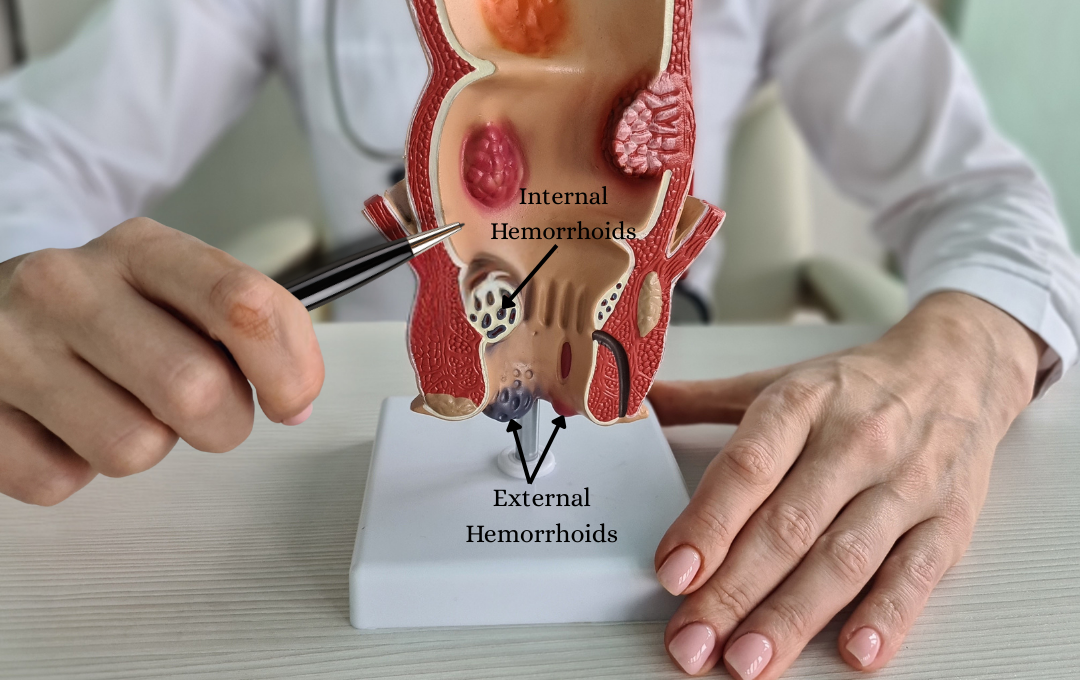
Almost everyone experiences symptomatic hemorrhoids from time to time. However, some may still experience bleeding, swelling, and discomfort even after exhausting self-care measures, such as topical creams or eating more fiber. If hemorrhoids are still causing discomfort after a few weeks, it may be time to seek medical attention.
Surgery is one option to treat persistent hemorrhoid symptoms. Patients are typically recommended alternatives to hemorrhoid surgery, such as hemorrhoid artery embolization (HAE), which are minimally invasive and have a shorter recovery period.
There are several alternatives to hemorrhoid surgery, and each one works differently to achieve similar results. Below, you’ll find everything you need to know about these hemorrhoid procedures. Understanding how these alternatives to hemorrhoid surgery work can help you determine which procedure is right for you.

Understanding Hemorrhoids and Treatment Tiers
Hemorrhoids, which are swollen varicose veins in the rectum, can develop internally or externally. While external hemorrhoids are more common, they are easier to treat with self-care methods, whereas internal hemorrhoids are more likely to need medical intervention. While some symptoms of hemorrhoids may resolve on their own, it is important to see a doctor if you experience any rectal bleeding.
Treatment for Internal Hemorrhoids
Doctors determine internal hemorrhoid treatments based on the hemorrhoid’s severity, which is graded as follows:
- Grade 1: early-stage internal hemorrhoid that may go unnoticed unless blood appears in the stool.
- Grade 2: the internal hemorrhoid starts protruding from the anus during a bowel movement but retracts on its own.
- Grade 3: the may need to be manually pushed back in.
- Grade 4: the prolapse is permanent and painful.
Once the severity of the hemorrhoid is diagnosed, the doctor will recommend treatment options, which are classified into three tiers:
Tier 1: Conservative Treatments
Lifestyle and over-the-counter remedies are typically recommended for grade 1 and 2 hemorrhoids with mild rectal bleeding, itching, and swelling.
Tier 2: Minimally Invasive Procedures
This tier is meant for grade 2 and 3 hemorrhoids that are persistent or large. These alternatives to hemorrhoid surgery carry fewer risks because they don’t require incisions.
Tier 3: Surgical intervention
Surgery is better suited for more severe grade 4 hemorrhoids or hemorrhoids that are unresponsive to non-surgical treatments.
A Closer Look at Hemorrhoid Treatments Tiers

Conservative Treatments
Conservative treatments are defined as non-medical interventions that help manage symptoms. Some examples include exercising regularly and not straining during bowel movements.
These treatments are often the first method people use to find relief, especially for those with mild grade 1 and 2 hemorrhoids. However, it usually isn’t effective for more advanced cases.
Minimally Invasive Procedures
Minimally invasive procedures are the most common treatments for stubborn hemorrhoids. These procedures can be done in outpatient settings, allowing people to return home the same day.
Hemorrhoid Artery Embolization (HAE)
HAE is a non-surgical, image-guided alternative to hemorrhoid surgery performed by an interventional radiologist to block blood flow to the hemorrhoids.
Rubber Band Ligation
Small rubber bands cut off blood supply to the hemorrhoid, causing it to fall off.
Sclerotherapy
Chemical solution is injected into the hemorrhoid to reduce blood flow and shrink hemorrhoids.
Infrared Coagulation
Heat from infrared light causes blood clotting in the hemorrhoid, restricting blood flow and causing the hemorrhoid to shrink.
Surgical Treatments
Surgery is generally considered for people with severe hemorrhoids. One type of hemorrhoid surgery is hemorrhoidectomy, which is the surgical removal of hemorrhoidal tissue. The other is called a hemorrhoidopexy, in which a circular stapler is used to reposition the hemorrhoid in the anal canal and remove excess tissue.
While these procedures are effective in removing symptomatic hemorrhoids, they carry risks, including infection, bleeding, and urinary retention.
If you are unsure which option will best relieve your symptoms, a hemorrhoid specialist can guide you toward the most appropriate care.

Hemorrhoid Artery Embolization in Detail
Hemorrhoid artery embolization (HAE) is an alternative to hemorrhoid surgery that can effectively reduce symptoms without the need for incisions, extensive preparation, or hospitalization. While hemorrhoid surgery requires the patient to do a full bowel preparation to clear the bowel 24 hours before the procedure, HAE doesn’t require this because it is performed through the vascular system.
During HAE, an interventional radiologist will insert a catheter into a blood vessel. Using advanced medical imaging, the catheter is then guided to the arteries supplying blood to the hemorrhoid. Tiny particles are injected into those arteries, which will start reducing blood flow to the hemorrhoid and stop the bleeding.
HAE is virtually painless and doesn’t require anesthesia, only mild sedation. The recovery period is shorter than surgery, and many patients still report symptom relief after a year.
Recovery Times for Hemorrhoid Procedures
The table below shows the average recovery times for each hemorrhoid procedure. In general, recovery from surgery will last longer than from a minimally invasive alternative. For example, HAE’s recovery time can last up to two days, while recovery from hemorrhoid surgery can last from weeks to months.
| Procedure | Recovery Time |
| Hemorrhoid Artery Embolization (HAE) | 1-2 days |
| Rubber Band Ligation | 1-2 weeks |
| Sclerotherapy | 1-2 days |
| Infrared Coagulation | 1-2 weeks |
| Hemorrhoidectomy | 1-2 months |
| Hemorrhoidopexy (Stapling) | 2-4 weeks |

Choosing the Right Hemorrhoid Procedure
The right hemorrhoid procedure will depend on several factors, such as the hemorrhoid’s size, severity, and symptoms. It’s recommended to see a specialist, notably colorectal surgeons, gastroenterologists, or interventional radiologists, to discuss your hemorrhoid symptoms so that they can provide the best treatment option.
USA Hemorrhoid Centers’ team of interventional radiologists specializes in hemorrhoid artery embolization, which is becoming a promising alternative to hemorrhoid surgery. Recognized by the Accreditation Association for Ambulatory Health Care, we ensure our patients receive the best hemorrhoid care in over 25 locations in Maryland, New York, New Jersey, Pennsylvania, Texas, Virginia, and Washington, D.C.
Hemorrhoids don’t have to be forever. Schedule an appointment with a specialist today to get on track toward relief.
